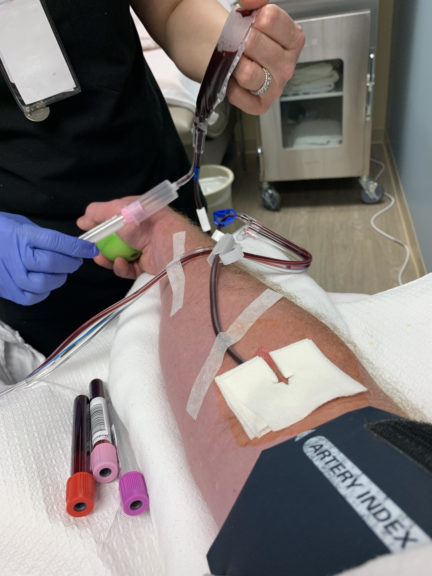For Steve Emfinger, donating his blood plasma at CHOC was fast, painless and a way to give meaning to his battle with COVID-19.
“It was very simple,” he said. “And to know it’s helping kids is very cool.”
Registered with the U.S. Food and Drug Administration, the CHOC Blood Bank is available to collect and process blood plasma donations from COVID-19 survivors. These donations are being used to help patients at CHOC and throughout the community.
“We’re still learning about COVID-19, but it’s possible that those who have recovered from the disease have produced antibodies to protect them from the infection,” says Dr. Antonio Arrieta, a pediatric infectious disease specialist who is studying the use of convalescent COVID-19 plasma at CHOC. “If so, their blood plasma would contain these antibodies and may be helpful in the treatment of COVID-19 disease in others.”
Since CHOC began collecting and processing blood plasma donations from recovered COVID-19 patients this spring, more than a dozen CHOC patients have benefited.
And as COVID-19 diagnoses continue to mount in Orange County and fall approaches, the need for blood plasma donations will only grow at CHOC, Dr. Arrieta says.
A surprising diagnosis
Typically, an early riser with boundless energy, Steve just felt zapped in late winter. Attributing the lethargy to two back-to-back trips he’d just taken, Steve decided to work from home.
Though his symptoms – including a slight cough and dizziness – were minor, Steve’s energy shift was so atypical that he ultimately decided to go to a local hospital. There, he was tested for the flu and strep throat and had a chest scan, which all came back negative.
Steve had one more test – for COVID-19. A couple days later, he got word the test was positive.
Steve hunkered down at home, and notified any friends, family and neighbors he’d been in contact within the weeks before his diagnosis. Some days he felt good – able to work remotely and cook meals – and others were much more challenging.
All in all, though, Steve felt fortunate to have mild symptoms, never experiencing a fever, body aches or significant respiratory problems, despite a lifelong mild case of asthma.
“I think I’m blessed to know that I had minor symptoms and was able to get through it and my family didn’t get sick,” he says.
As Steve’s diagnosis came early into the pandemic’s spread in Southern California, he was initially reluctant to share his story with a broader network of friends, family and colleagues. But as he got more comfortable, Steve’s decision to tell others proved fortuitous.
A friend who worked at CHOC told Steve about the COVID-19 convalescent plasma program and how badly donations were needed.
“I had heard that blood plasma was needed, but I didn’t know where to find a donor center,” he said. “I called CHOC the next day to make an appointment.”

Steps to donate
Potential donors must meet some criteria to be eligible:
- Donors must show laboratory test proof of their COVID-19 diagnosis either through a diagnostic test (nasopharyngeal swab) at the time they were sick, or a positive serological test for SARS-CoV-2 antibodies after they recovered.
- Donors must have been symptom-free for at least 14 days before they donate.
- They must meet all other health requirements for blood donors.
- Though donors may be male or female, female donors will need to meet some additional requirements that the Blood Bank team will help explain further.
Confirming these requirements takes about a week. Once donors are confirmed and at the Blood Bank, the simple donation process takes about two hours. Donors can return every 28 days to donate again.
Steve is already on his second donation at CHOC and plans to continue in the future – in addition to donating blood and platelets.
“To help someone else makes it all worth it,” he says.
To schedule an appointment or learn more, call the CHOC Blood Bank at 714-509-8339.




